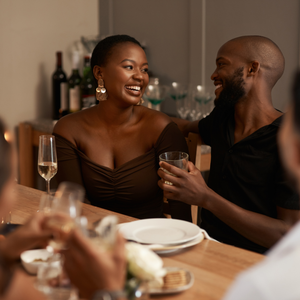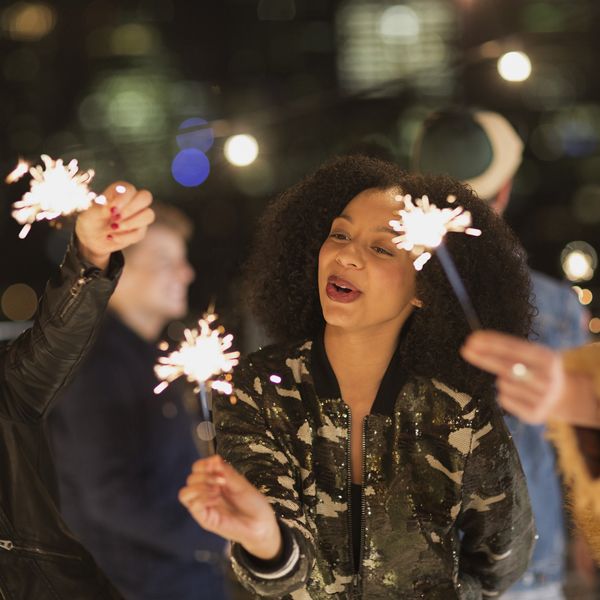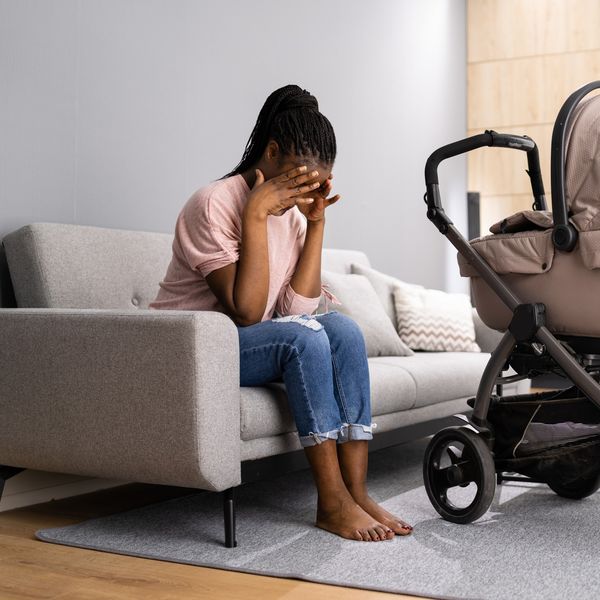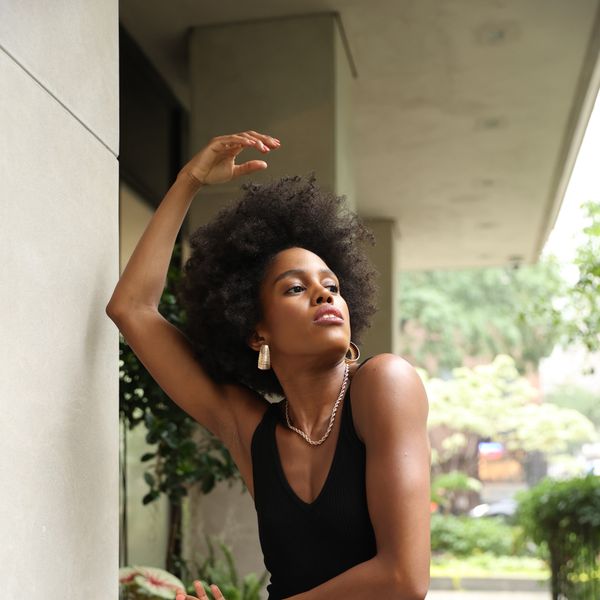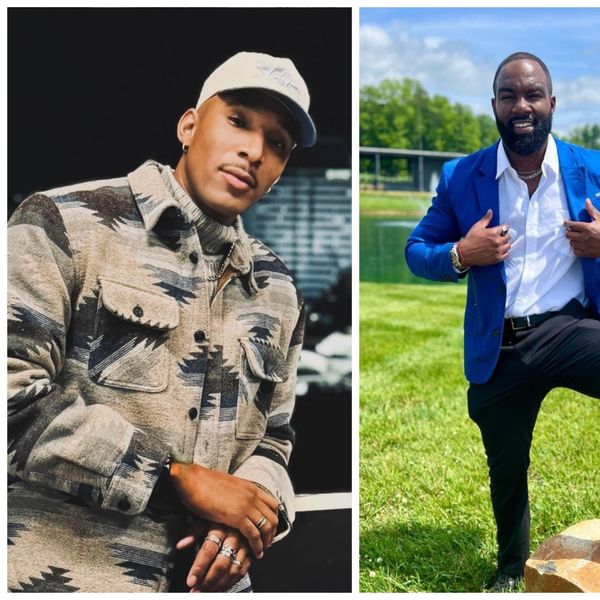
There is a quote by Santosh Kalwar that states, "Love has no culture, boundaries, race, and religion. It is pure and beautiful like early-morning sunrise falling in lake." While this might be true, the year 2020 has made us more aware of the different experiences we face in this country based on the color of our skin. With this year's cultural climate shift, I was curious to learn more about the experience of being in an interracial relationship during this time. While I believe every relationship is different and has its own nuances, what does it look like when race has played a part in the relationship, if at any point at all? I was able to speak to two couples who offered some perspective on how they navigate everything together.
Courtney & Jackson

Courtesy of Courtney & Jackson
Courtney: We had been friends for 10 years and have been a couple for five. We basically met through mutual friends. Before I met Jackson, I've mostly dated within my race or been with men of color. With Jackson, for the more serious relationships, he has dated women of color before he met me. As far as race being an important part in our relationship, it is not something we center our relationship around. We talk about race a lot, and learning about Jackson's childhood was different than what I had expected. Hearing that he grew up in the inner city and he was around people that looked like me kind of checked me a little to not be as narrow-minded.
Jackson: I do feel that I have a different perspective than the average person from the South. I spent a lot of time in neighborhoods where I was the only white person. So I was exposed early on to the mistreatment that happens in communities and by law enforcement. Even in those moments, I knew I was treated differently than the people I was hanging out with.
Have you ever felt that you are treated differently by family and friends because you are in an interracial relationship?
Jackson: My parents were gracious when they didn't understand why I would bring black women home. So they have been working on things before they met Courtney. But with the recent Black Lives Matter movement, there have been great conversations.
Courtney: With Jack's parents, they grew up traditionally Republican. They also have a son (Jack) who dates black women and is a criminal defense attorney, so they get tidbits on how unfair the justice system is. With George Floyd, they were made aware of so many things at once. They have had some really in-depth and hard conversations with us as a couple, saying, "'We weren't fully where we are now and we want to talk about. We are a little upset we weren't there before, but we are here now and we want to ask and learn more.'" I think that's been one of the beauties of us being together in these times.
What is a misconception that you often face as an interracial couple?
Jackson: One misconception is that people don't understand that you are still handling things as a unit. People think that because we are in an interracial relationship, we [either] have things figured out, or the opposite, [with] people thinking that everything is screwed up in the relationship because of the crazy times. Neither one is true.
Courtney: For me being a black woman, I get put in this stereotype of white-washing my culture and intentionally trying to be with a white person instead of me being with the person I love. It's a little bit harder because if you speak to him and talk to him, you can understand why I'm with him. But on the surface it might not look that way, especially during the pandemic.

"As far as race being an important part in our relationship, it is not something we center our relationship around. We talk about race a lot, and learning about Jackson's childhood was different than what I had expected. Hearing that he grew up in the inner city and he was around people that looked like me kind of checked me a little to not be as narrow-minded."
Are there any things you had to unlearn about race in order to gain an understanding of each other?
Jackson: One thing that I will say in general—something that she repeats—'All skin folk aren't kinfolk.' Everybody that you expect to be on your side, whether they are related to you or because they look like you, is not always going to be on your side.
Courtney: That is something I am actively practicing, too, not just for people who look like me, but for people I have known my whole life. I am just trying to learn more about people because not everyone wants to learn more, and even though they look like you, you can't make them do anything they don't want to.
Ashley & Chea

Chea: We met for the first time at the Jay-Z and R. Kelly 'Best of Both Worlds' concert. I had recently gotten out of a relationship, and she was in a relationship at the time. She actually grew up with one of our mutual friends, Jero, who I ended up working with, and we would intentionally continue to cross paths and got introduced to each other.
Ashley: We were friends for four years before we started any commitment. We had a really deep friendship, so we both trusted each other. To be candid, at the time, we were just having fun. I wasn't thinking about being with him forever. So I didn't take his race into consideration. When I became pregnant, that is when race started to become a topic to discuss more.
Chea dated any woman he was attracted to regardless of race before we got together, where I specifically dated black men. I grew up in a pro-black community. So for me, when I visualized my life, I thought I was going to have dark brown babies like myself, marry a dark-skinned man, listen to Talib Kweli, and burn incense. It was intentional, but it wasn't exclusionary.
How do you educate one another (and yourselves) on your racial or cultural differences?
Chea: When we started our relationship, we really educated each other around the black culture and practicing [Islam]. She learned about my father's side and Buddhism. If we knew there was something that was important to us, we would share that with each other. I think what I have been mainly focusing on the last five years years is bridging the gap between what I've learned versus what I know from how I grew up.
I grew up in a majority-white neighborhood. So, 2020 has been an eye-opener where I'm not doing something correctly or no matter what I say, it's not making a substantial change. Whereas with Ashley, she's not at the point to sit down and educate people on how it is to be a black woman in America. She has been doing this her whole life, so she stands for educating yourself.
Have you ever felt you were being treated differently by family and friends because you were in an interracial relationship?
Chea: My mother is Caucasian and my father is Cambodian. It's layered, but on the surface, my mother's side was more accepting. We would go to family gatherings and there wouldn't be any issues really. On my father's side, the Asian side, the biggest pushback came from my stepmother. Both of my parents remarried, but with my father's side, there was confusion on how our relationship was coming together. You know, when people don't have an actual issue with something until it actually affects them? I think that's something you can apply to a lot of different things. Everything is great until it impacts you. Now five years into our marriage and 10 years into our relationship, I feel we are at a place where things are copacetic, but there are still those things that need to be worked through.

"I grew up in a pro-black community. So for me, when I visualized my life, I thought I was going to have dark brown babies like myself, marry a dark-skinned man, listen to Talib Kweli, and burn incense. It was intentional, but it wasn't exclusionary."
Were there things you had to teach your partner about being black in America that they may not have understood before?
Ashley: That's the thing about being in an interracial relationship. Chea doesn't experience the world the way I do. Even when I am getting profiled in a store, he is still existing in his own bubble. I sometimes would have to point it out to him and make him walk into a store and see who speaks to him. Now, watch when I walk in. I think these are things that white people miss everyday. When you are not existing in these spaces, you have the ability to look at things from an objective point of view, whereas we don't.
Chea: It's a very true experience and it's dependent on where we are, whether it's online or in-person.
"When you are not existing in these spaces, you have the ability to look at things from an objective point of view, whereas we don't."
Are there any things you had to unlearn about race in order to gain an understanding of each other?
Ashley: The growth for me came from within our marriage. I stopped looking at his Asian family as racist and started diving deeper into understanding where they are coming from having immigrated to this country. I don't think his family was being intentionally racist to me, they were just ignorant. But as soon as they got to know me, most of them changed immediately.
Chea: The thing that I had to unlearn is that every scenario doesn't always have the same outcome. For example, the police brutality, I think the common discourse for people who are not black is that, 'What did so and so do to get to this point?' That was my common way of thinking. Whether it was good or bad, something must have happened. I learned to let go of that and empathize more, regardless of what happened before.
Race aside, what is one thing that you truly enjoy about your partner?
Courtney: Jack is widely empathetic. He is able to relate to a lot of people on different journeys because he listens and can be present with them.
Jackson: There's a ton, but if I have to pick just one, it would be her creative spirit. I admire that about her and hope that her creative spirit sparks some creativity in me.
Ashley: Chea always felt like home to me, even before we were serious—when we were just friends. He is honestly one of my favorite people in the world. He is very loving and is a good person to everybody, not only to me which is important to me. If I had to choose one thing it would be his heart. Because that's where all of his good qualities stem from.
Chea: I feel like throughout various stages of our relationship I have loved her, and I just keep finding my love for her growing bigger. I can't really explain it. As I am trying to become a better person, she has been forcing me and helping me because she can see things I don't see. So I love her for that reason as well.
The two important things to know about relationships, whether you and your bae are of the same race or different races, are to be understanding of one another and to make your own rules. When you are intentional about knowing your partner's likes and dislikes, how you complement one another, and being empathetic to each other's experiences, race does not have to be a huge factor.
There will always be different obstacles that can make things challenging, but once you know who your partner is as a human being, you are able to create your own blueprint in order to make it through together. You should not go by other people's opinions or what others expect your relationship to be and with whom. At the end of the day, it is about what makes both of the people happy. Everyone is different and in the words of Chea, "Your results may vary."
Featured Image by Shutterstock
Because We Are Still IT, Girl: It Girl 100 Returns
Last year, when our xoNecole team dropped our inaugural It Girl 100 honoree list, the world felt, ahem, a bit brighter.
It was March 2024, and we still had a Black woman as the Vice President of the United States. DEI rollbacks weren’t being tossed around like confetti. And more than 300,000 Black women were still gainfully employed in the workforce.
Though that was just nineteen months ago, things were different. Perhaps the world then felt more receptive to our light as Black women.
At the time, we launched It Girl 100 to spotlight the huge motion we were making as dope, GenZennial Black women leaving our mark on culture. The girls were on the rise, flourishing, drinking their water, minding their business, leading companies, and learning to do it all softly, in rest. We wanted to celebrate that momentum—because we love that for us.
So, we handpicked one hundred It Girls who embody that palpable It Factor moving through us as young Black women, the kind of motion lighting up the world both IRL and across the internet.
It Girl 100 became xoNecole’s most successful program, with the hashtag organically reaching more than forty million impressions on Instagram in just twenty-four hours. Yes, it caught on like wildfire because we celebrated some of the most brilliant and influential GenZennial women of color setting trends and shaping culture. But more than that, it resonated because the women we celebrated felt seen.
Many were already known in their industries for keeping this generation fly and lit, but rarely received recognition or flowers. It Girl 100 became a safe space to be uplifted, and for us as Black women to bask in what felt like an era of our brilliance, beauty, and boundless influence on full display.
And then, almost overnight, it was as if the rug was pulled from under us as Black women, as the It Girls of the world.
Our much-needed, much-deserved season of ease and soft living quickly metamorphosed into a time of self-preservation and survival. Our motion and economic progression seemed strategically slowed, our light under siege.
The air feels heavier now. The headlines colder. Our Black girl magic is being picked apart and politicized for simply existing.
With that climate shift, as we prepare to launch our second annual It Girl 100 honoree list, our team has had to dig deep on the purpose and intention behind this year’s list. Knowing the spirit of It Girl 100 is about motion, sauce, strides, and progression, how do we celebrate amid uncertainty and collective grief when the juice feels like it is being squeezed out of us?
As we wrestled with that question, we were reminded that this tension isn’t new. Black women have always had to find joy in the midst of struggle, to create light even in the darkest corners. We have carried the weight of scrutiny for generations, expected to be strong, to serve, to smile through the sting. But this moment feels different. It feels deeply personal.
We are living at the intersection of liberation and backlash. We are learning to take off our capes, to say no when we are tired, to embrace softness without apology.
And somehow, the world has found new ways to punish us for it.

In lifestyle, women like Kayla Nicole and Ayesha Curry have been ridiculed for daring to choose themselves. Tracee Ellis Ross was labeled bitter for speaking her truth about love. Meghan Markle, still, cannot breathe without critique.
In politics, Kamala Harris, Letitia James, and Jasmine Crockett are dragged through the mud for standing tall in rooms not built for them.
In sports, Angel Reese, Coco Gauff, and Taylor Townsend have been reminded that even excellence will not shield you from racism or judgment.

In business, visionaries like Diarrha N’Diaye-Mbaye and Melissa Butler are fighting to keep their dreams alive in an economy that too often forgets us first.
Even our icons, Beyoncé, Serena, and SZA, have faced criticism simply for evolving beyond the boxes society tried to keep them in.
From everyday women to cultural phenoms, the pattern is the same. Our light is being tested.

And yet, somehow, through it all, we are still showing up as that girl, and that deserves to be celebrated.
Because while the world debates our worth, we keep raising our value. And that proof is all around us.
This year alone, Naomi Osaka returned from motherhood and mental health challenges to reach the semifinals of the US Open. A’ja Wilson claimed another MVP, reminding us that beauty and dominance can coexist. Brandy and Monica are snatching our edges on tour. Kahlana Barfield Brown sold out her new line in the face of a retailer that had been canceled. And Melissa Butler’s company, The Lip Bar, is projecting a forty percent surge in sales.

We are no longer defining strength by how much pain we can endure. We are defining it by the unbreakable light we continue to radiate.
We are the women walking our daily steps and also continuing to run solid businesses. We are growing in love, taking solo trips, laughing until it hurts, raising babies and ideas, drinking our green juice, and praying our peace back into existence.
We are rediscovering the joy of rest and realizing that softness is not weakness, it is strategy.
And through it all, we continue to lift one another. Emma Grede is creating seats at the table. Valeisha Butterfield has started a fund for jobless Black women. Arian Simone is leading in media with fearless conviction. We are pouring into each other in ways the world rarely sees but always feels.

So yes, we are in the midst of societal warfare. Yes, we are being tested. Yes, we are facing economic strain, political targeting, and public scrutiny. But even war cannot dim a light that is divinely ours.
And we are still shining.
And we are still softening.
And we are still creating.
And we are still It.

That is the quiet magic of Black womanhood, our ability to hold both truth and triumph in the same breath, to say yes, and to life’s contradictions.
It is no coincidence that this year, as SheaMoisture embraces the message “Yes, And,” they stand beside us as partners in celebrating this class of It Girls. Because that phrase, those two simple words, capture the very essence of this moment.
Yes, we are tired. And we are still rising.
Yes, we are questioned. And we are the answer.
Yes, we are bruised. And we are still beautiful.

This year’s It Girl 100 is more than a list. It is a love letter to every Black woman who dares to live out loud in a world that would rather she whisper. This year’s class is living proof of “Yes, And,” women who are finding ways to thrive and to heal, to build and to rest, to lead and to love, all at once.
It is proof that our joy is not naive, our success not accidental. It is the reminder that our light has never needed permission.
So without further ado, we celebrate the It Girl 100 Class of 2025–2026.
We celebrate the millions of us who keep doing it with grace, grit, and glory.
Because despite it all, we still shine.
Because we are still her.
Because we are still IT, girl.
Meet all 100 women shaping culture in the It Girl 100 Class of 2025. View the complete list of honorees here.
Featured image by xoStaff
Give Thanks: 10 Tips For Hosting An Absolutely Awesome Friendsgiving
If you’ve never checked out an episode of the ReLiving Single Podcast featuring Maxine and Synclaire — oops, I mean Erika Alexander and Kim Coles — it’s worth listening to an episode or two; especially if you’re someone like me who watches the Living Single reruns on TV One, sometimes, like they just came out. Good times.
And what does this even remotely have to do with Friendsgiving? Well, if you ever wondered what the origin story of this non-holiday-holiday is, legend has it that it’s mostly due to the combination of a 2007 tweet and the show that tries to act like it wasn’t birthed out of Living Single: Friends (I’m not the only one who feels this way either; you can read more about all of that here, here and here).
Apparently, there was a Thanksgiving episode that featured all of the friends having dinner together. And y’all, there was simply no way that I was going to mention the latter without shouting out the original (amen?).
Okay, so with that out of the way — Friendsgiving. Something that I appreciate about twists to holidays like this is that it’s a reminder that there is no one way to celebrate special occasions. And so, if, for whatever the reason, you will not or cannot be with family during the holiday season, there are certainly other alternatives at your disposal.
That being said, if the thought of spending time with friends this Thanksgiving is something that you’d like to do, yet you’re not sure how to host it in a way that will make Friendsgiving a fan favorite for your entire circle — I’ve got 10 suggestions that can make the planning process easy as pumpkin (or sweet potato) pie.
1. Position Chrysanthemums or Orchids for Your Table Décor
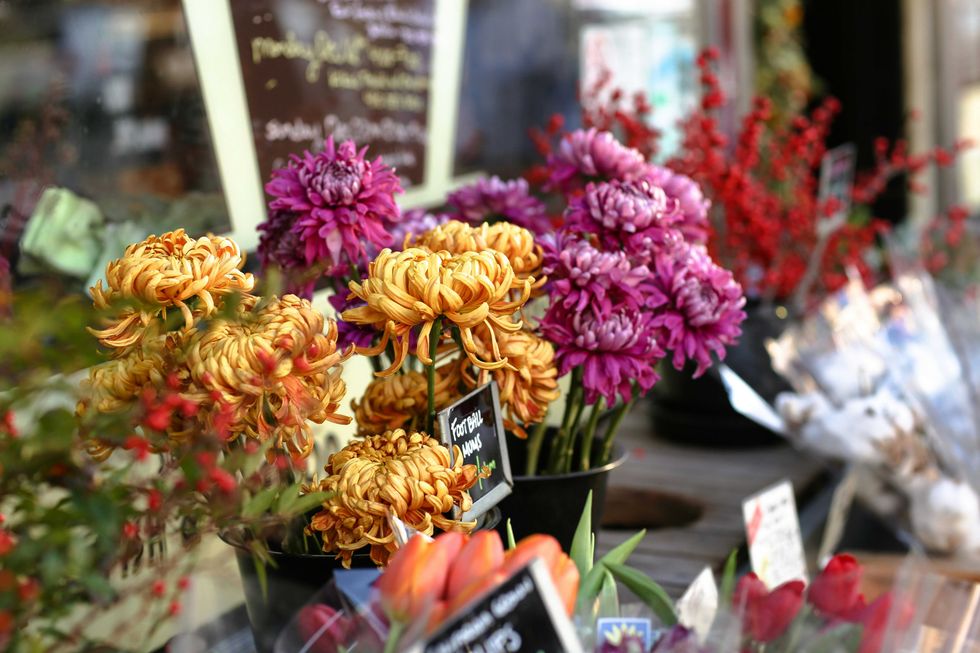
Unsplash
Let’s start with décor first. Listen, aside from cleaning up your place, you don’t have to be over the top. If you put together a really nice centerpiece or put a flower at each table setting, honestly, you’re all good. And if you’re someone who is big on details and symbolism, my recommendation would be to go with some chrysanthemums and/or orchids.
When it comes to chrysanthemums, not only are they a peak fall flower, they represent things like friendship and happiness. And orchids? They tend to bloom during the fall and spring seasons and, not only are they about luxury, certain orchid colors also symbolize friendship (for the record, yellow roses symbolize friendship too). Perfect.
2. Incorporate Scents That Cultivate Gratitude
Speaking of cultivating a warm and inviting space, you can never go wrong with scented soy candles — or at least having an essential oil diffuser in a few spots. Some scents that actually help to bring in the spirit of gratitude include vanilla, jasmine, ginger, cedarwood and frankincense.
3. Use Upscale Paper Products to Dine With
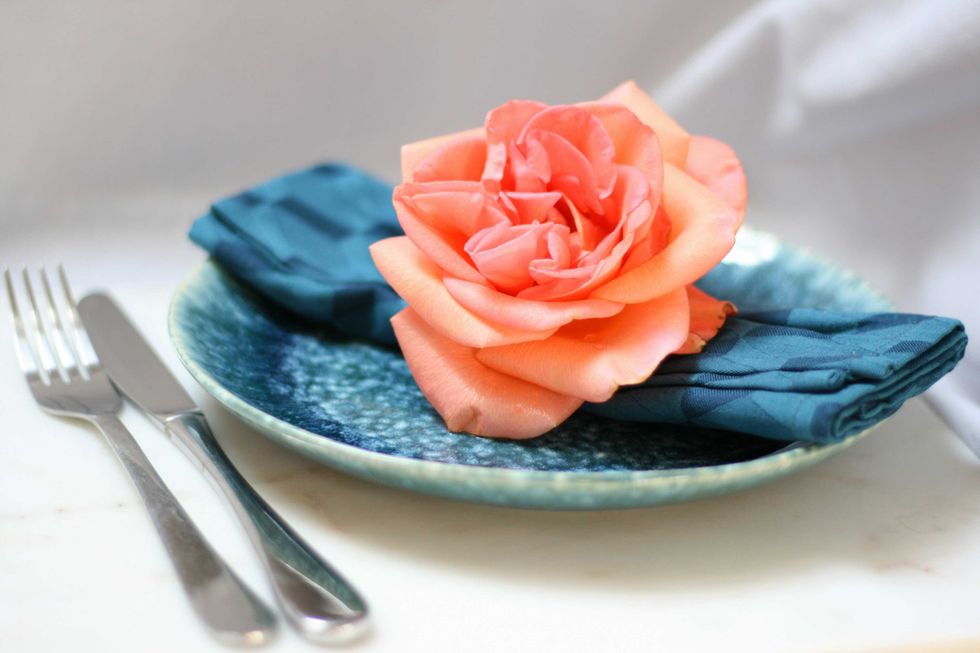
Unsplash
Let’s be real — a lot more of us would probably host events in our home if it wasn’t for the mess that is left behind in our kitchen once the festivities are over. Wanna avoid that? Use paper plates. No, I don’t mean the cheap Styrofoam ones. SMDH. These days, there are paper (and plastic) plate brands that will low-key blow your mind when it comes to how bougie they look. Some that are worth considering are located here, here and here.
4. Handwrite Thank-You Notes (Use Them As Place Settings)
If you’re like Tiffany (from the HBO series Insecure — what a time) was at that memorable dinner party when all hell broke loose between Lawrence and Issa and you’re pretty anal — I mean, particular — LOL — about place settings, it’s a nice touch to pick up some blank thank-you cards that you can write a personalized “I’m thankful for you because…” message in. Place each one where you’d like each friend to sit. They won’t see it coming and it’s a really nice touch.
5. Have Everyone Bring Their Favorite Homemade Dish

Unsplash
Okay, and what if what has you on the fence about hosting is you don’t feel like doing a ton of cooking? Chile, this is where the concept of having a potluck comes in. Get everyone to bring the dish that they claim they cook the best and make sure to let them know how many individuals you plan on coming (so that they will make enough). You can even make a game out of it by having everyone anonymously vote for the first, second and third best dishes out of the bunch. Take it up a notch by having a prize for each winner.
6. Take a Warm Drink and Dessert Poll Beforehand
You know what isn’t discussed enough about dinner parties? Folks bringing desserts that other people don’t even like. SMDH. You can avoid this from becoming an issue at your Friendsgiving by sending an email (most people prefer that to group chats; let’s be real — and make sure to BCC everyone as well) asking everyone to share what their top three favorite desserts and warm drinks are. Then pick the top 2-3 out of the bunch. That way, you won’t have a ton of (for instance) coffee cake or apple cider lying around that no one even wanted in the first place.
7. Create a Signature Friendsgiving Mocktail and Cocktail
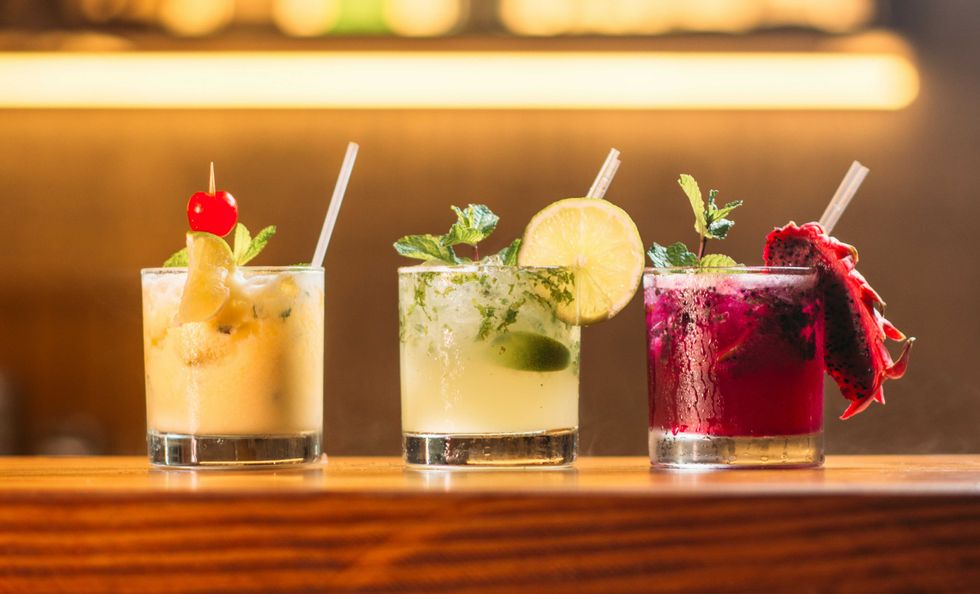
Unsplash
Speaking of drinks, another way to make your Friendsgiving memorable is to come up with a signature mocktail (for those who don’t consume alcohol) and cocktail. For the mocktail, you can also poll your friends about their favorite mocktail or fruits and come up with a mixture of your own. For the cocktail — although National Friendship Day is actually in August, I did peep that there are certain drinks that have been created in its honor. Some of them are located here for you to do a bit of tweaking on (if you’d like).
8. Ask Everyone to Share Their “Favorite Friend Quality” of Another
You know how it’s customary for everyone to go around and share what they are truly thankful for before having dinner? Well, to continue along with the Friendsgiving theme, have each person share what their favorite friend quality is about the person to their right. If folks are just meeting each other for the first time, instead they can share what they value the most in friendship overall, along with a story of how it was displayed to them personally over the past 12 months.
9. Send Each of Your Guests Home with a Fresh Gratitude Journal
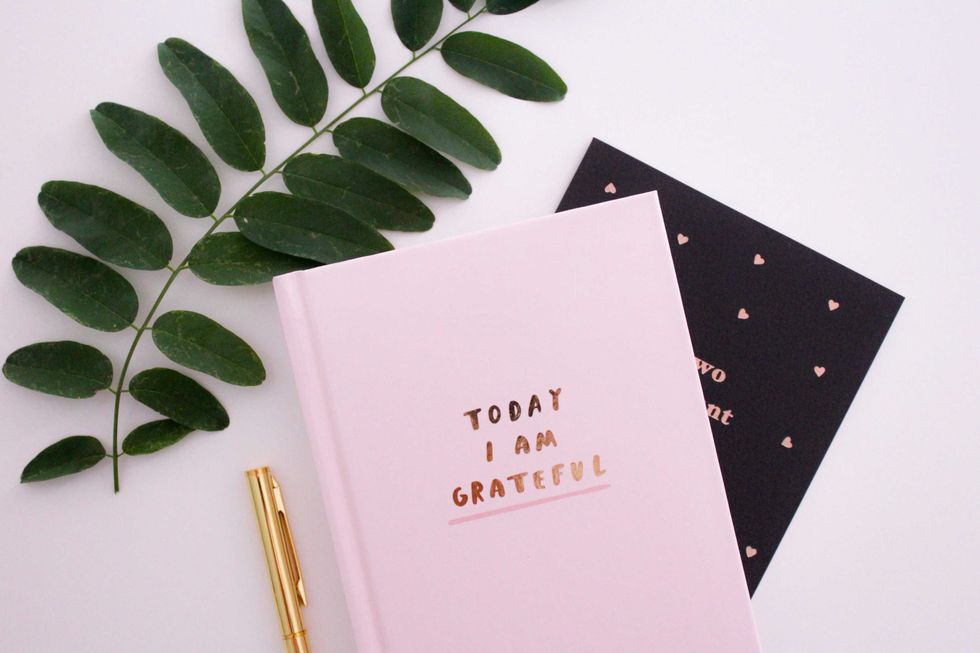
Unsplash
Wanna send folks home with a nice parting gift? It would be so on-trend to give each of them a gratitude journal. Listen, we are in some crazy times right through here (at least in the States) and so, encouraging your friends to set some time aside, regularly, to think about and then outwardly express what they are grateful for? That helps to keep stress down, keep things in perspective and it reminds us all to maintain a positive mindset as much as possible.
10. Watch a Nostalgic Movie
While everyone is enjoying dessert and drinks, how about watching a movie that brings back fond memories? A list of some of the most popular movies to come out previous Thanksgiving weekends is located here and a list of some favorite Black holiday-themed films can be found here. It’s a way to wind down and share some laughs before everyone heads home.
___
Friendsgiving. What a wonderful way to celebrate your friends while also observing Thanksgiving in a way that is totally on your terms. And now that you know how to put it together, what are you waiting for? Hit your friends up and let them know that, whether it’s on actual Thanksgiving Day or a few days before or after, you’ve got a special dinner in mind.
One that has a good time with amazing friends written ALL over it.
Let’s make things inbox official! Sign up for the xoNecole newsletter for love, wellness, career, and exclusive content delivered straight to your inbox.
Featured image by PeopleImages/Shutterstock


